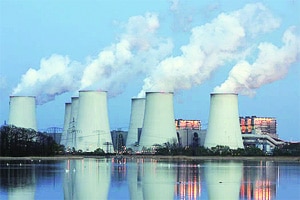Bharat Heavy Electricals (BHEL), the government-owned power equipment manufacturer, is foraying into international arena with two thermal power plants. The plants are to be built at a cost of R3,000 crore in Russia.
A formal agreement is expected to be inked in the presence of the Russian President Vladmir Putin, who will be visiting India next month for the annual summit-level meeting with Prime Minister Narendra Modi, when he will address a joint session of Parliament for the first time. Officials of energy ministries of both the countries have been in talks for striking a deal on setting up the power projects.
On the agenda of the talks between external affairs minister Sushma Swaraj and the deputy prime minister of Russia Dmitry Rogozin, at the 20th India-Russia Inter-Governmental Commission Meeting in New Delhi, is the issue of BHEL entering Russia for the thermal power plants.
The meeting between the leaders, held earlier this month, was to lay the groundwork for the 15th annual India-Russian bilateral summit next month. The two sides have also finalised the details of the joint “economic vision” package that will be unveiled when Putin visits India.
During the discussion, it was proposed that BHEL takes up the construction of two 240-MW units of a power plant in Ulan-Ude, the capital of the Russian internal republic of Buryatia, as part of settling a debt India owes to Russia.
A senior official of BHEL confirmed that talks were on and progress may be reported after the government-to-government negotiations between the two countries next month.
According to diplomatic sources, the Russian side is actively considering BHEL’s proposal as the company has said it would raise finances for the projects using mechanisms under the trade and economic cooperation agreement between the two governments.
The total investment in the project is expected to be in the range of $600 million, which will be shared equally by both sides. While BHEL would put in half of the project cost, in Russia’s case their contribution of $300 million would be paid out of a Soviet-era debt that India owes to Russia, and which has now been regularised under a rouble-rupee agreement.
After the two governments approve plans, BHEL in partnership with state-owned entity of Buryatian would take up the entire construction of the project on engineering, procurement and construction (EPC) basis and hand it over to Buryatian government for running later.
This would be the first instance of an Indian company tapping the debt repayment fund that has been created to clear off almost $2 billion of dues that India owes to Russia.
So far, Russian companies have used this route for making investments into India.
Now reverse investment under the route is considered as part of exercise to strengthen engagement of companies in both the countries.

